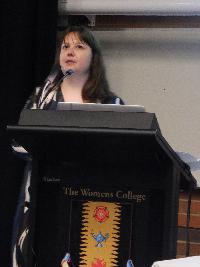Availability of literature in Lithuanian - 1970's to 1980's Thread poster: Tomás Cano Binder, BA, CT
|
|---|
Dear colleagues and nevertheless friends,
This is one, I reckon, for our Lithuanian colleagues, as it relates mostly to the Lithuanian language.
I happen to be working on an academic paper around the translations of a Spanish novel, Miguel Delibes' Cinco horas con Mario (1966), and, thanks to a Lithuanian colleague, got my hands on a 1979 translation into Lithuanian. It strikes me that the novel, albeit very famous indeed, was translated so quickly into a languag... See more Dear colleagues and nevertheless friends,
This is one, I reckon, for our Lithuanian colleagues, as it relates mostly to the Lithuanian language.
I happen to be working on an academic paper around the translations of a Spanish novel, Miguel Delibes' Cinco horas con Mario (1966), and, thanks to a Lithuanian colleague, got my hands on a 1979 translation into Lithuanian. It strikes me that the novel, albeit very famous indeed, was translated so quickly into a language as distant as Lithuanian, and in fact earlier than other languages with a much bigger audience.
A striking fact is that UNESCO's Index Translationum shows only three books translated into Lithuanian from 1970 to 1978, compared to quite an explosion of translation into Lithuanian from 1979 onward, with hundreds of translated books published every year.
It could well be that UNESCO's database is missing translations done up to 1978, but in any case, the number of translations in 1979 (226) is remarkable. In 2007, published translations in to Lithuanian had reached 1400 works.
My question to you is: seeing the many translations produced back then in the late 70's and early 80's, still under the USSR, would you say that the "system" of literature available in Lithuanian needed complementing with foreign works, as sometimes happens with languages that are strenghtening/recovering from a low-status situation (in this particular case, for political reasons)?
Thanks a lot for any hints!
Tomás ▲ Collapse
| | | | Heinrich Pesch 
Finland
Local time: 19:31
Member (2003)
Finnish to German
+ ...
| I doubt those numbers | Apr 10, 2017 |
I have no idea about the real situation in Lithuanian, but translation of fiction into the official languages of the Soviet Union was very busy and state financed. Surely the main works also of Western literature were well known and eagerly read, as long as there was no problem with ideology. More so, if the author was critical of capitalism, and who was not in those times? And surely titles from the "socialist" countries and the Soviet republics were translated promptly into the other official ... See more I have no idea about the real situation in Lithuanian, but translation of fiction into the official languages of the Soviet Union was very busy and state financed. Surely the main works also of Western literature were well known and eagerly read, as long as there was no problem with ideology. More so, if the author was critical of capitalism, and who was not in those times? And surely titles from the "socialist" countries and the Soviet republics were translated promptly into the other official languages. ▲ Collapse
| | | | | Translations in literary magazines | Apr 10, 2017 |
I would not say Cinco horas con Mario was an anti-capitalist piece. It did question Franco's regime, the outcome of our Civil War, and ignorance and clichés of that society.
Now, the same translator who worked the wonder of finding the Lithuanian translation of Cinco horas just gave me this very important fact on this matter: she mentions that various translations even in Soviet times used to appear in literary magazines such as Pergalė (Victory) and cultural periodi... See more I would not say Cinco horas con Mario was an anti-capitalist piece. It did question Franco's regime, the outcome of our Civil War, and ignorance and clichés of that society.
Now, the same translator who worked the wonder of finding the Lithuanian translation of Cinco horas just gave me this very important fact on this matter: she mentions that various translations even in Soviet times used to appear in literary magazines such as Pergalė (Victory) and cultural periodicals like Literatūra ir menas (Literature and Art).
This colleague confirms that there have been very many translations into Lithuanian in the period, so the magazines probably explain the low number of translations in the Index Translationum! The number of translations in 2007 (roughly 1400) is probably more plausible, so probably still in the early 1980's translations went to magazines and not published books per se. ▲ Collapse
| | | | diana bb 
Lithuania
Local time: 19:31
English to Lithuanian
+ ...
| Magazines do not explain those tiny numbers of translated books | Apr 10, 2017 |
They published just smaller texts. Maybe some appeared in several successive issues, but again, they were just for smaller works and poetry.
I really cannot explain how books used to be chosen for translation. There must have been certain moments of illumination of the minds of the responsible nomenklatura, because some really good books appeared from 1970 to 1980.
I must admit that a large share of translated literature came from the so-called friendly nations of the socialist bloc... See more They published just smaller texts. Maybe some appeared in several successive issues, but again, they were just for smaller works and poetry.
I really cannot explain how books used to be chosen for translation. There must have been certain moments of illumination of the minds of the responsible nomenklatura, because some really good books appeared from 1970 to 1980.
I must admit that a large share of translated literature came from the so-called friendly nations of the socialist bloc (there and then, Hungary, Czechoslovakia, Poland, etc.), but books by the authors of 'ideological enemies' were also available. Five Hours with Mario, Hiroshima mon amour, some others. I should look through my mother's shelves to give you more titles.
[Edited at 2017-04-10 17:01 GMT] ▲ Collapse
| | |
|
|
|
Vanda Nissen 
Australia
Local time: 02:31
Member (2008)
English to Russian
+ ...
| High quality translations | Apr 10, 2017 |
Although I do not know exactly how the books got picked up what I know is the fact translations into all 15 languages were done by highliy qualified translators. Often, it was a two steps translation: 1. word to word, 2. polishing done by a professional writer, Lithuanian, Estonian, Ukrainian etc. native. There are rumors that some of the translations were better than the original texts.
My grandmother was from Ukraine, and I clearly remember that the selection of children books translated... See more Although I do not know exactly how the books got picked up what I know is the fact translations into all 15 languages were done by highliy qualified translators. Often, it was a two steps translation: 1. word to word, 2. polishing done by a professional writer, Lithuanian, Estonian, Ukrainian etc. native. There are rumors that some of the translations were better than the original texts.
My grandmother was from Ukraine, and I clearly remember that the selection of children books translated into Ukrainian was striking. A small library in a tiny town had Astrid Lindgren, Mark Twain, contemporary authors - all translated into Ukrainian. I really enjoyed it (it was impossible to get all those books in Russian). ▲ Collapse
| | | | Heinrich Pesch 
Finland
Local time: 19:31
Member (2003)
Finnish to German
+ ...
| Contact an antiquarian | Apr 11, 2017 |
It is true, literature translation was a very prestigious profession in the USSR, and well paid. Books from that time must still be on sale at antique shops and flea markets. Western authors were also invited to read and travel, caviar and vodka ad libitum. It was some kind of paradise for cultural people as long as they kept their mouth shut about reality under socialism.
There must be a state library in Vilnius, where they have it all.
| | | | To report site rules violations or get help, contact a site moderator: You can also contact site staff by submitting a support request » Availability of literature in Lithuanian - 1970's to 1980's | Anycount & Translation Office 3000 | Translation Office 3000
Translation Office 3000 is an advanced accounting tool for freelance translators and small agencies. TO3000 easily and seamlessly integrates with the business life of professional freelance translators.
More info » |
| | Protemos translation business management system | Create your account in minutes, and start working! 3-month trial for agencies, and free for freelancers!
The system lets you keep client/vendor database, with contacts and rates, manage projects and assign jobs to vendors, issue invoices, track payments, store and manage project files, generate business reports on turnover profit per client/manager etc.
More info » |
|
| | | | X Sign in to your ProZ.com account... | | | | | |







